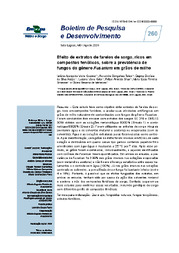Efeito de extratos de farelos de sorgo, ricos em compostos fenólicos, sobre a prevalência de fungos do gênero Fusarium em grãos de milho.
Efeito de extratos de farelos de sorgo, ricos em compostos fenólicos, sobre a prevalência de fungos do gênero Fusarium em grãos de milho.
Author(s): QUEIROZ, V. A. V.; TELES, A. G.; SILVA, D. D. da; COTA, L. V.; SILVA, F. A.; SIMEONE, M. L. F.; MENEZES, C. B. de
Summary: RESUMO - Este estudo teve como objetivo obter extratos de farelos de sorgo, ricos em compostos fenólicos, e avaliar suas atividades antifúngicas em grãos de milho naturalmente contaminados com fungos do gênero Fusarium. Foram conduzidos dois ensaios com extratos dos sorgos SC 319 e CMSXS 3019 obtidos com as soluções metanol/água 80/20% (Ensaio 1) e acetona/água 80/20% (Ensaio 2). Foram utilizados os extratos de sorgo integrais (contendo água e os solventes metanol e acetona) ou evaporados (sem os solventes). Água e as soluções extratoras puras foram usadas como controle. Após desinfestação, cem grãos de milho foram imersos em 50 mL de cada solução e distribuídos em quatro caixas tipo gerbox contendo papel de filtro umedecidos com ágar-água e incubadas a 25 °C por 7 dias. Após esse período, os grãos foram examinados, individualmente, e aqueles identificados com colônias de Fusarium foram quantificados. Em ambos os ensaios, a prevalência de Fusarium foi ? 99% nos grãos imersos nas soluções evaporadas (sem metanol ou acetona) e não houve diferença estatística entre esses tratamentos e o controle com água (100%). Já nos grãos imersos nas soluções contendo os solventes, a prevalência desse fungo foi bastante inferior (entre 4 e 16%). Portanto, é possível que os efeitos fungicidas dos extratos, em ambos os ensaios, tenham sido por causa da ação dos solventes metanol e acetona e não dos compostos fenólicos do sorgo. Contudo, sugerem-se mais estudos para confirmar esses resultados, incluindo genótipos de sorgo com diferentes perfis de compostos fenólicos. ABSTRACT- This study aimed to obtain sorghum bran extracts, rich in phenolic compounds, and evaluate their antifungal activity in maize grains naturally contaminated with fungi of the genus Fusarium. Two trials were conducted with sorghum extracts SC 319 and CMSXS 3019 obtained with 80/20% methanol/ water solution (Trial 1) and 80/20% acetone/ water solution (Trial 2). Whole sorghum extracts (containing water and the solvents methanol and acetone) or evaporated (without the solvents) were used. Water and the pure extracting solutions were used as controls. After disinfestation, one hundred maize grains were immersed in 50 mL of each solution and distributed in four gerbox-type boxes containing filter paper moistened with agar-water and incubated at 25 °C for seven days. After this period, the grains were examined, individually, and those identified with Fusarium colonies were quantified. In both trials, the prevalence of Fusarium was ? 99% in grains immersed in evaporated solutions (without methanol or acetone) and there was no statistical difference between these treatments and the control with water (100%). However, in grains immersed in solutions containing solvents, the prevalence of this fungus was much lower (between 4 and 16%). Therefore, it is possible that the fungicidal effects of the extracts, in both trials, were due to the action of the solvents methanol and acetone and not to the phenolic compounds of the sorghum. However, further studies are suggested to confirm these results, including sorghum genotypes with different profiles of phenolic compounds.
Publication year: 2024
Types of publication: Booklets
Unit: Embrapa Maize & Sorghum
Observation
Some of Embrapa's publications are published as ePub files. To read them, use or download one of the following free software options to your computer or mobile device. Android: Google Play Books; IOS: iBooks; Windows and Linux: Calibre.
Access other publications
Access the Agricultural Research Database (BDPA) to consult Embrapa's full library collection and records.
Visit Embrapa Bookstore to purchase books and other publications sold by Embrapa.

